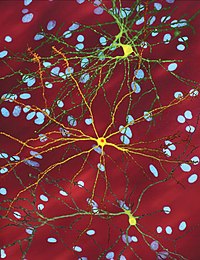
Compendium of causative genes and their encoded proteins for common monogenic disorders
Sign Up to like & getrecommendations! Published in 2021 at "Protein Science"
DOI: 10.1002/pro.4183
Abstract: A compendium is presented of inherited monogenic disorders that have a prevalence of >1:20,000 in the human population, along with their causative genes and encoded proteins. “Simple” monogenic diseases are those for which the clinical… read more here.
Keywords: compendium causative; genes encoded; monogenic disorders; causative genes ... See more keywords

A resource to explore the discovery of rare diseases and their causative genes
Sign Up to like & getrecommendations! Published in 2021 at "Scientific Data"
DOI: 10.1038/s41597-021-00905-y
Abstract: Here, we describe a dataset with information about monogenic, rare diseases with a known genetic background, supplemented with manually extracted provenance for the disease itself and the discovery of the underlying genetic cause. We assembled… read more here.
Keywords: discovery rare; rare diseases; causative genes; discovery ... See more keywords

Direct evaluation of neuroaxonal degeneration with the causative genes of neurodegenerative diseases in drosophila using the automated axon quantification system, MeDUsA.
Sign Up to like & getrecommendations! Published in 2023 at "Human molecular genetics"
DOI: 10.1093/hmg/ddac307
Abstract: Drosophila is an excellent model organism for studying human neurodegenerative diseases (NDs). However, there is still almost no experimental system which could directly observe the degeneration of neurons and automatically quantify axonal degeneration. In this… read more here.
Keywords: system; quantification; degeneration; axonal degeneration ... See more keywords

Atypical microdeletion in 22q11 deletion syndrome reveals new candidate causative genes
Sign Up to like & getrecommendations! Published in 2018 at "Medicine"
DOI: 10.1097/md.0000000000009936
Abstract: Rationale: 22q11 deletion syndrome, the most common chromosomal microdeletion disease, is caused by megabase-sized deletions on chromosome 22q11.2. It is characterized by a wide spectrum of congenital anomalies in velopharyngeal and facial, cardiac, genitourinary, vertebroskeletal,… read more here.
Keywords: deletion syndrome; microdeletion; causative genes; deletion ... See more keywords

Genetic Profile and Associated Characteristics of 150 Korean Patients with Retinitis Pigmentosa
Sign Up to like & getrecommendations! Published in 2021 at "Journal of Ophthalmology"
DOI: 10.1155/2021/5067271
Abstract: Purpose Retinitis pigmentosa (RP) shows great diversity between genotypes and phenotypes, and it is important to identify the causative genes. This study aimed to analyze the molecular profiles, associated ocular characteristics, and progression of RP… read more here.
Keywords: causative genes; retinitis pigmentosa; korean patients; associated characteristics ... See more keywords

Novel potential causative genes in carotid paragangliomas
Sign Up to like & getrecommendations! Published in 2019 at "BMC Medical Genetics"
DOI: 10.1186/s12881-019-0770-6
Abstract: BackgroundCarotid paragangliomas (CPGLs) are rare neuroendocrine tumors that arise from the paraganglion at the bifurcation of the carotid artery and are responsible for approximately 65% of all head and neck paragangliomas. CPGLs can occur sporadically… read more here.
Keywords: novel potential; causative genes; paragangliomas; cpgls ... See more keywords

A Novel Gene CDC27 Causes SLE and Is Associated With the Disease Activity
Sign Up to like & getrecommendations! Published in 2022 at "Frontiers in Immunology"
DOI: 10.3389/fimmu.2022.876963
Abstract: Background As genetic genetic factors are important in SLE, so screening causative genes is of great significance for the prediction and early prevention in people who may develop SLE. At present, it is very difficult… read more here.
Keywords: screen causative; activity; gene; causative genes ... See more keywords